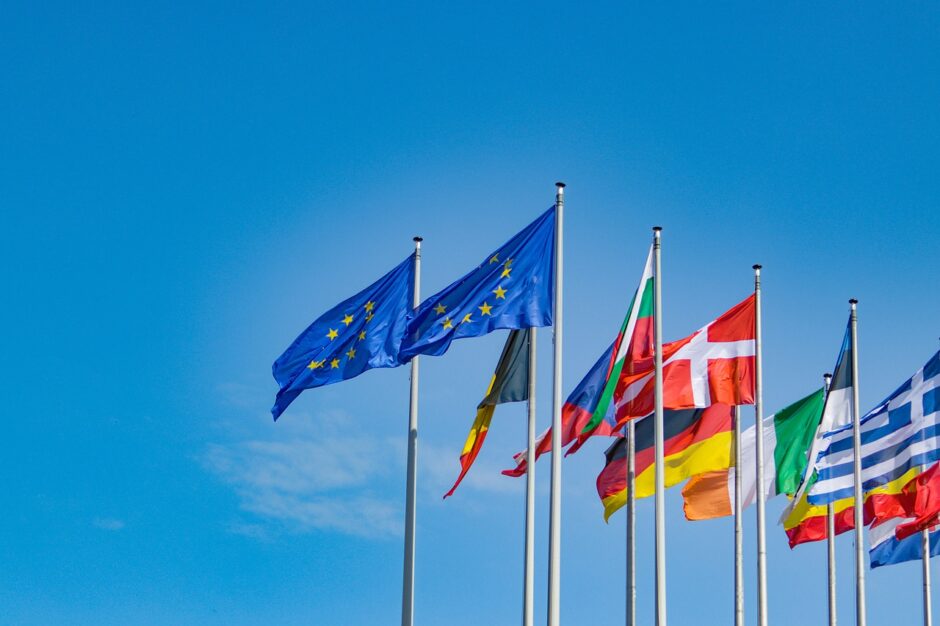Whether or not Norway should seek to enter the European Union has been debated in waves in Norway since the 1960s. The debate has at times been heated, and split up political parties. Leading up to the 2025 election, the Liberal Party (V) has announced their campaign for Norway entering the EU. However, the Liberal Party only received 4,6% of votes in the last national election – just making it into Parliament. For the campaign to succeed, they would require support from several parties. So, what do the other parties say? Can the EU offer international cooperation about the big questions or merely undermine Norway’s democracy and control over own resources?
Norway has held two referendums about entering the EU, in 1972 and 1994. This resulted in 53,3% and 52,2% votes for “no”, respectively. However, the most recent referendum was 30 years ago, meaning that no Norwegians under the age of 48 have been able to vote on the matter. This is one of the Liberal Party’s main arguments for asking the EU-question again. “I am 43 years old and have never been able to voice my opinion about a possible membership, and the same is true for a large part of the population. I think that is undemocratic”, argues Guri Melby, leader of the Liberal Party. The Liberal Party further argues that the world is a better place with international cooperation, that freedom is created in community with others, and that having “a seat at the table where decisions are made” will enhance human rights and democracy. However, the very meaning of what ‘democracy’ entails and what a EU membership would mean for democracy splits the Norwegian Parliament.
The positions on a Norwegian EU membership cannot be divided simply by the traditional linear left-right political spectrum. However, there are two main blocks, although the only other party that agrees with the Liberal Party is the party to their right, the Right Party (H). Despite not having launched entering the EU as a campaign, the Right Party also highlights the importance of international cooperation in an increasingly unstable world. However, the right side is split, aligning with most of the center and left.
“Cooperation also means compromises”, argues the far right Progress Party (Frp) and “the EEA agreement has become a straitjacket”, argues the far left Red Party (R). In contrast to the Liberal Party, the Progress Party argues that the EU has lost its original freedom and peace-promoting function, and has turned into a supranational bureaucracy obstructing Norway’s freedom of choice over own affairs. However, the party wants to enhance the EFTA and Schengen Agreements. Center-right Christian Democrats (Krf), Center Party (Sp), and the Socialist Left Party (SV) mostly agree, as they fear that an EU membership would entail a decline for democracy by moving decision-making further away from the local people.

The Center Party, the Red Party and the Socialist Left Party go even further than the Progress Party, as they argue for exiting the EEA and the Schengen agreement, they do so, however, for different reasons. While the Center Party seeks to re-enforce stricter national border controls in the name of enhancing national control over decisions and politics, the Red Party seek to tear down ‘Fort Europe’, and the Socialist Left Party wants an evaluation on the agreement’s consequences. Hence, their motivations and goals differ strikingly, although their stances towards the EU resemble each other.
The complexity of the issue is made visible by the Socialist Left Party (SV). The Socialist Left argues that moving some decision making power over to the EU would be undemocratic. Still, SV highlights the benefits that a European cooperation could have for the big questions like the climate crisis, migration, security, and energy. Hence, it might not be as simple as answering ‘yes’ or ‘no’.
Control over own resources and affairs, as well as local democracy, seem to be a common argument amongst the parties opposing a Norwegian EU membership. The Liberal Party even pointed this out, as they emphasize that finding “good solutions” for the Norwegian fishery and agriculture would be a premise for the membership. For other parties, like the Red Party, the railway, energy and working life are important aspects that they argue is best decided on a local level. Local democracy is thus an important value which arguably does not necessarily align with an international union. However, international cooperation can enhance possibilities for solving the large problems of today, like the climate crisis, and might be important for promoting peace. Then it seems to come down to the question: is the EU an undemocratic institution forcing decisions and systems onto its members, or does it enhance democracy and peace through cooperation? Most of the political parties in Norway seem to be leaning towards the former, despite the Liberal Party’s campaign.
It then remains to see if the Liberal Party’s campaign will succeed in making the EU membership question central in the 2025 election and sparking another wave of a public debate. Regardless of one’s perspective on how an EU membership would affect the Norwegian democracy, one might agree that it could be time for another referendum. The Green Party and the largest party in Norway, the Labor Party, also point this out, as they refrain from taking an official stance on the question before the people have had a say. In the discussion around the definitions and implications of ‘democracy’, a new referendum might indeed be the most democratic thing to do.
While the parties may disagree on what democracy and cooperation entails, they do agree on the importance of democracy. This might serve as a reminder for EU citizens about the importance of using one’s voice and vote in the upcoming EU election. How the EU functions, and what it means for its members and cooperators, are fundamental questions – questions that Norwegians cannot vote over in June, but which will affect them nevertheless.






